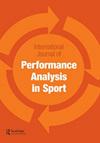2019年橄榄球世界杯裁判身体健康属性与比赛需求的关系
IF 1.6
4区 教育学
Q1 Health Professions
International Journal of Performance Analysis in Sport
Pub Date : 2022-01-02
DOI:10.1080/24748668.2022.2031527
引用次数: 3
摘要
摘要本研究考察了橄榄球联盟首席裁判的体能属性与比赛需求之间的关系。在2019年橄榄球世界杯之前,11名裁判接受了人体测量和体能评估(40米短跑、Yo-Yo间歇恢复测试、1.2公里穿梭跑)。通过全球定位系统设备评估比赛活动(总距离、高速跑步距离[>5 m·s−1]、平均速度和1分钟、5分钟和10分钟内的峰值强度),并使用胸部佩戴的监测器测量心率变量(HRmean、累计心率区、90%HRmax以上的时间)。40米短跑时间与比赛中的最高速度(P=0.004;r=-0.79)和高速跑距离(P=0.037,r=-0.63)显著相关。同样,∑7皮褶厚度与高速跑距离显著相关(P=0.01,r=-0.72)。Yo-Yo间歇恢复试验、1.2-km穿梭跑试验、年龄和体重指数与匹配需求变量无显著相关性(P>0.05,r=-0.58-0.53)。结果表明,裁判可能有必要优化短跑能力和身体脂肪成分,以在比赛中实现更大的高速跑量和更高的峰值速度。Yo-Yo间歇恢复测试和1.2公里穿梭跑测试与特定的比赛活动变量无关,因此可能与橄榄球联盟裁判的监测无关。本文章由计算机程序翻译,如有差异,请以英文原文为准。
The relationships between physical fitness attributes and match demands in rugby union referees officiating the 2019 Rugby World Cup
ABSTRACT This study examined the relationships between physical fitness attributes and match demands in lead rugby union referees. Eleven referees underwent anthropometric and fitness assessments (40-m sprint, Yo-Yo Intermittent Recovery Test, 1.2-km shuttle run) prior to the 2019 Rugby World Cup. Match activities were assessed via global positioning system devices (total distance, high-speed running distance [>5 m·s−1], average speed, and peak intensities over 1-min, 5-min, and 10-min epochs) and heart rate variables were measured using chest-worn monitors (HRmean, summated-heart-rate-zones, time above 90% HRmax). Forty-metre sprint time was significantly related to maximum speed (P = 0.004; r = −0.79) and high-speed running distance (P = 0.037, r = −0.63) during matches. Likewise, ∑7 skinfold thickness was significantly correlated with high-speed running distance (P = 0.01, r = −0.72). Yo-Yo Intermittent Recovery Test, 1.2-km Shuttle Run Test, age, and body mass index exhibited non-significant correlations (P > 0.05, r = −0.58 to 0.53) with match demand variables. Results suggest it may be pertinent for referees to optimise sprint capacity and body fat composition to execute greater high-speed running volumes and reach higher peak speeds during matches. Yo-Yo Intermittent Recovery Test and 1.2-km shuttle run tests are not correlated to specific match activity variables and thus may not be relevant for monitoring of rugby union referees.
求助全文
通过发布文献求助,成功后即可免费获取论文全文。
去求助
来源期刊

International Journal of Performance Analysis in Sport
SPORT SCIENCES-
CiteScore
4.70
自引率
4.80%
发文量
38
审稿时长
>12 weeks
期刊介绍:
The International Journal of Performance Analysis in Sport aims to present current original research into sports performance. In so doing, the journal contributes to our general knowledge of sports performance making findings available to a wide audience of academics and practitioners.
 求助内容:
求助内容: 应助结果提醒方式:
应助结果提醒方式:


